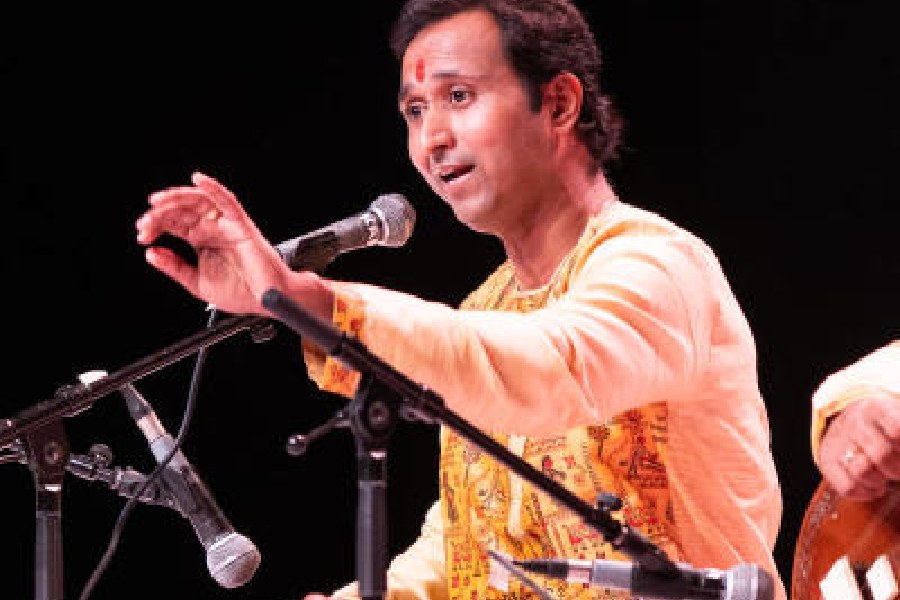An All India Radio grade-A artiste, Debapriya Adhikari has released his first commercial collaboration on T-series, Raushan raushan, produced by Ramshanker S. The Telegraph chatted with the classical singer about his commercial debut.
When did you find your calling in music?
I was not forced to take up music. As an energetic kid, I was in all sorts of extracurricular activities. I learned dancing for six years. I had always had this affinity for music, which my mother, Anita Adhikari, noticed quite early on. She was a disciple of Pandit Jiv Nath Jha Tanraj. I received initial lessons from her for three-four years. Seeing my growing interest in the art form, she put me in the caring hands of Pandit Samaresh Chawdhury from whom I got my taalim for 14 years. Later I learned the basics of north Indian classical music under the tutelage of Pandit Kumar Prasad Mukherjee. I have also trained with Pandit Vijay Kichlu ji for a while, although I was never his direct student. Then I moved on to Padma Vibhushan Girija Devi. Currently, I am training under Pandit Uday Bhawalkar.
Tell us about your professional journey.
It all happened with winning an AIR music competition on Hindustani classical vocal at the national level where I presented Calcutta in 2002. Soon I got enlisted as grade-A artiste. I was born and brought up in Sindri in Jharkhand. A highlight of my career is meeting Samanwaya Sarkar in Calcutta. Our collaboration was meant to be. Music, friendship, guidance from all my gurus, everything has happened in my life so naturally. AIR is a pilgrimage for any aspiring musician.
Tell us about Raushan raushan. Did this happen naturally too?
It was Diwali... two years ago. Samanwaya told me to sing “for” Instagram. I sang the first four lines of Raushan raushan, in the same tune, recorded it, and shared it on Instagram. Two years down the line, here is the commercial version the song. Incidentally, Samanwaya’s wife, Sneha Chatterjee, who’s my disciple, is my fellow lead singer in this song.
How would you define your style of music?
My music is an amalgamation of elements I have received from people of so many gharanas. Girija Devi taught me a different perception of music. I belong to a Bengali family and at the same time I belong to Bihar. I feel my dialect has a pure aspect in terms of understanding the language and pronunciation. I take utmost care of the taans, according to what the bandish demands — it cannot be very strong and it cannot be very soft either. If I’m singing ghazal, I won’t be using the same kind of trill. In ghazal too, you use it in a different way. I pay a great deal of attention to the elements of raas in bandish and raag. Every raag has its own character. If I’m singing in the Adana raag, the taan would be very flamboyant and strong. But if I’m doing Yaman, it emits a divinely romantic aspect. The taan should also be in tandem with the same. If I am doing tappa, the taans will differ. For Raushan raushan, I have done a lot of taans that do not come from the khayalia or tappa gharana. Those are like really ghazal-ish. My gurus have opened the doors for me to go beyond my learnings.
Duet performance or solo, which is more rewarding?
Duet has enriched me in ways more than I would ever be able to explain in words. It has made me stronger as a soloist too. Duet completed me as a human being because I know when I need to stop and why I should stop. And it’s not for my sake, it’s for the sake of music. Samanwaya and I have been performing as a vocalist-sitarist duo around the globe since 2006, have directed a documentary film on Girija Devi, Girija: A Lifetime in Music, and sung together for the Australian film The Sleeping Warrior. We are two bodies, and one soul.
You have been a part of so many prestigious concerts. Any memorable experiences?
That would be our concert at a sitar festival in St. Petersburg. The ambience and the audience appreciation bowled us over. Then the Womad festival in the UK was 72 hours of different sorts of music. Amidst such a global festival, a couple walked up to us and said they had not listened to anything better than what had we performed there. Hearing this from folks of a different nationality was indeed very touching.
How was the experience of recording your first commercial song?
I won’t say it was tough because the song is mine. The lyrics are also mine. But yes, the journey was different. The song is meant for the youth.
Picture courtesy: Debapriya Adhikari
